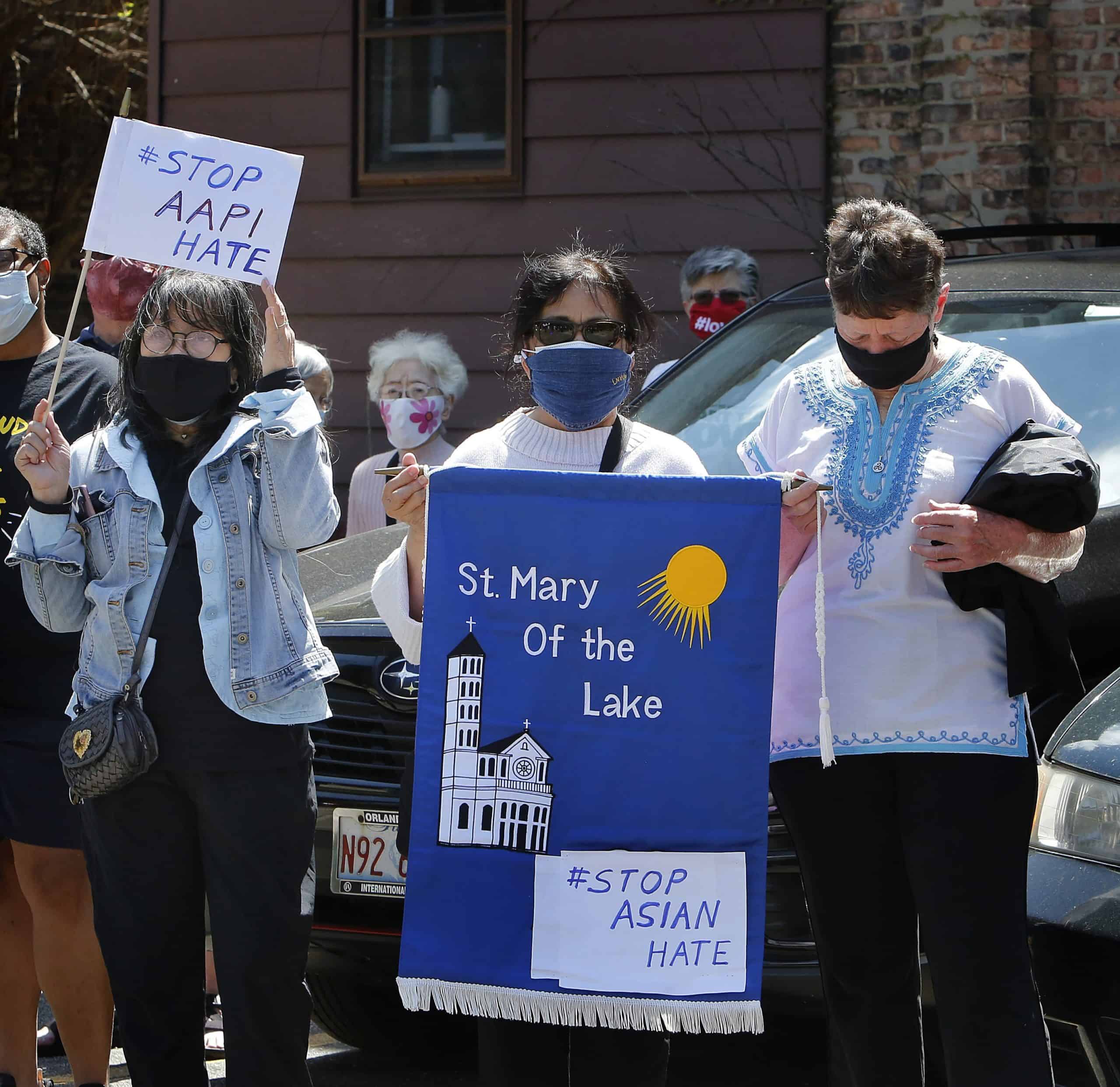“Hear us, see us,” the sign read. The woman quietly holding it was Asian American, one of many people of Asian descent attending a multiracial rally in Berkeley, California calling for an end to anti-Asian hate. Just weeks after the shootings in Atlanta, in which six Asian American women were killed, and in the midst of continued attacks against Americans of Asian descent, the rally was an opportunity to stand together with Asian Americans in a collective moment of grief, rage, and resolve.
One by one, young students gave speeches sharing their stories, declaring pride in their Asian heritage. They spoke about the need for Americans of Asian descent to stand up, to share their stories, and to work for justice.
“Hear us, see us” captured the spirit of the rally. Too often, Americans of Asian descent have been made to feel invisible, our nearly two-hundred years of history in the United States erased from history books and classes, our very presence in this country questioned.
“Hear us, see us.” We belong here. We are Americans.
The Asian American community is a diverse coalition of many languages and ethnicities. I am a Chinese Jamaican American, the son of a European American father and Chinese Jamaican mother. My story is merely a small thread in the fabric of Asian America. I was born in Sacramento, California, one of several generations of Californians on my father’s side, whose family arrived in California in 1849. My mother’s Chinese family has been in Jamaica since the turn of the last century. The second language I heard growing up was Jamaican patois, with just a few words in my family’s Hakka Chinese dialect thrown in for good measure.
Growing up, I was keenly aware of race and the different ways in which people would speak to my parents. My mother was often complimented on her English and asked where she was from. Imagine the confusion that ensued when people would see my mother’s Chinese face and hear that she was Jamaican. My white father, who speaks and reads Chinese, would often have to act as her translator in Chinese social situations. It is shocking to realize that my parent’s marriage would have been illegal in several states had they gotten married five years earlier. When my mother arrived in the United States in the early 60’s, there was a very strict quota in place for Chinese immigrants, capped at just 105 Chinese persons per year. Had she not been a student, my mother would have fallen under the Chinese quota, even though she arrived in the U.S. on a British passport. Unlike other national quota systems, the Chinese were grouped together by race and not by nationality.
All too often, Asian Americans have been erased from American history. In light of the shootings in Atlanta, it is important to understand the Page Act of 1875. The Page Act characterized Chinese men as coolies, that is, cheap labor, and Chinese women as prostitutes. It sought to bar their migration to the United States. This was solidified in the 1882 Chinese Exclusion Act, which barred most Chinese people from immigrating to the United States, forbidding those who managed to immigrate from becoming U.S. citizens.
I can look out at Angel Island from the windows of the Jesuit community in Berkeley. Angel Island has been characterized as the Ellis Island of the West. But it was far from Ellis Island. Immigrants from China, and later from Japan and other parts of Asia, were held and detained, sometimes for up to two years. One can still read poignant poems of detainees carved in the barracks. It was described by one Chinese American women who passed through it as a child as a very sad and lonely place. A wall of memorials from descendants of those who passed through Angel Island commemorates the sacrifices and hopes of those who have gone before, a poignant reminder of their struggles.
Violence against the Chinese and Asian American community is not new. In 1871, there was a mass lynching of Chinese men in Los Angeles. In 1886, the Chinese community of Seattle was driven out. They were forced to board ships to take them away from the city. This was one of many “drivings out” in the American West, in which Chinese communities were forced to flee. Similarly, the Japanese Americans were interned during WWII, their loyalties to the United States questioned simply because of their ancestry. In 1982, Vincent Chin was murdered in Detroit because he was mistaken for being Japanese, and Japan at that time was blamed for the decline of the American auto industry. His murderers received probation and a $3,000 fine. In 1989, young children of Southeast Asian ancestry were gunned down at Cleveland Elementary School in Stockton, California. Hauntingly, the Atlanta shootings on March 16, 2021 occurred on the anniversary of the MyLai Massacre in which Vietnamese women were sexually assaulted by American troops and then massacred, along with their children during the Vietnam War. The shootings in Atlanta and the vicious attacks on Asian American have left the Asian American community reeling. Such violence has skyrocketed during the pandemic by 150%.
As we conclude this first Asian American Heritage Month, we should recall that there are concrete ways to respond to anti-Asian racism. Reaching out to Asian American friends and family members to see how they have been is an act of solidarity and friendship. Reading about Asian America and Asian American history provides a context in which to understand the dynamics of anti-Asian racism and it raises awareness. Praying with Asian representations of Christ and the Blessed Mother allows one to see the full humanity of Asian Americans, who bear the divine image. Christ responded to hatred with love and infinite compassion. Let us do the same, working for God’s kingdom one step at a time.

